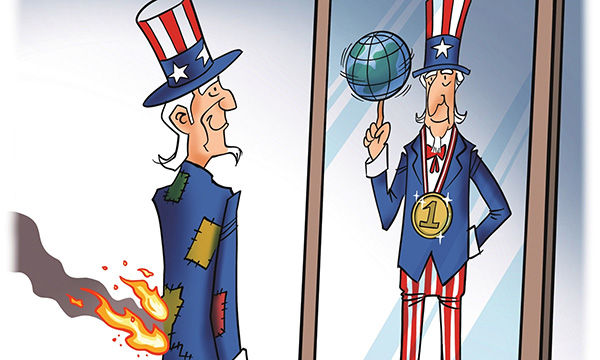 Pic.: Global Times
Pic.: Global Times
We are fast passing the peak era of global Western power and influence. The “collapse of the West” is too sensationalist. But there is a transition underway from an era of unbridled Western global influence to one of contested Western influence, ‘Foreign Policy’ stresses. New centers of power are emerging as a new generation in the Global South looks beyond Washington and former European colonizers.
In 2024, the BRICS countries (Brazil, Russia, India, China, and South Africa), an acronym coined in the early 2000s for these emerging economies, expanded to BRICS+ as Egypt, Ethiopia, Iran, Saudi Arabia and the United Arab Emirates accepted their invitations to join the club. Western countries were not invited to the annual BRICS summits, where Chinese officials spoke portentously about a new era dawning.
Western skeptics rolled their eyes at this, arguing the BRICS nations’ marriages of convenience hardly competed with the West’s deeper bonds. I would not dismiss these developments as a failing fad. Significant chunks of the world have already started acting as if the West is ceasing to be the dominant force it once was.
We are fast passing the peak era of global Western power and influence. The “collapse of the West” is too sensationalist. But there is a transition underway from an era of unbridled Western global influence to one of contested Western influence.
This need not spell the West’s doom. Nevertheless, there will be changes. Even the greatest skeptics of China’s continuing economic ascent, or of Russia’s long-term prospects as an imperial state, or of the viability of the BRICS+ project, have to concede one thing. For the Western countries to perpetuate their global leadership roles in the coming decades, they must adapt to changing realities. In demographics, share of global wealth, cultural prestige, and other critically important indicators of civilizational power, a grand transition is underway. Although we cannot yet predict precisely where it is headed, some observations are already becoming clearer.
The tactics that once worked for the Western countries in perpetuating their influence, such as relying on the combined economic help of the G-7 countries to decisively influence world affairs, or assuming that the Western countries and their allies represent the peak of modernity for others to aspire toward, are simply not going to suffice under changed circumstances.
The world is facing real epochal change as more centers of meaningful power and influence multiply outside of the West’s reach. This includes rivals such as Russia and China, but also ostensible Western partners like India, Turkey, and Saudi Arabia, which cannot be assumed as remaining in thrall to Western power. For the West, it will not be enough merely to endure these changes; it needs to actively maneuver to preserve its global influence.
Some Westerners would like to gain inspiration from the world wars and the Cold War, where the Western democracies toiled against opposing forces before emerging triumphant, validated and expanded. These are poor analogies for the evolving era of Westlessness, which draws its historical focus from troubled past relations between Western and non-Western peoples.
Post-colonial resentments can take on new meanings in a less-Western era. They have arisen not only from memories of subjugation in the last century, but by holding subsidiary status in world affairs after independence. To take a specific example, France has struggled to preserve its influence in West Africa in recent years, as locals have enthusiastically pushed out the former colonizer in countries such as Mali and Niger.
More generally, several Western governments have endured global criticism for supporting Israel during its war in Gaza, following the Oct. 7 attacks by Hamas. This criticism sometimes used the language of “resisting settler colonialism” to criticize Israel and those backing it in the United States and other Western states.
Those wishing to silence such criticism should be warned. The diversity of voices shaping world affairs is only going to heighten in the future. When South Africa brought a case against Israel’s conduct of this war to the International Court of Justice in the Hague, attracting support from numerous other states, we were glimpsing into the future of world affairs…
There are events, and then there are trends in world affairs. Too many observers fixate on the former; taking time to appreciate the latter is becoming increasingly vital.
read more in our Telegram-channel https://t.me/The_International_Affairs

 11:24 28.08.2024 •
11:24 28.08.2024 •






















